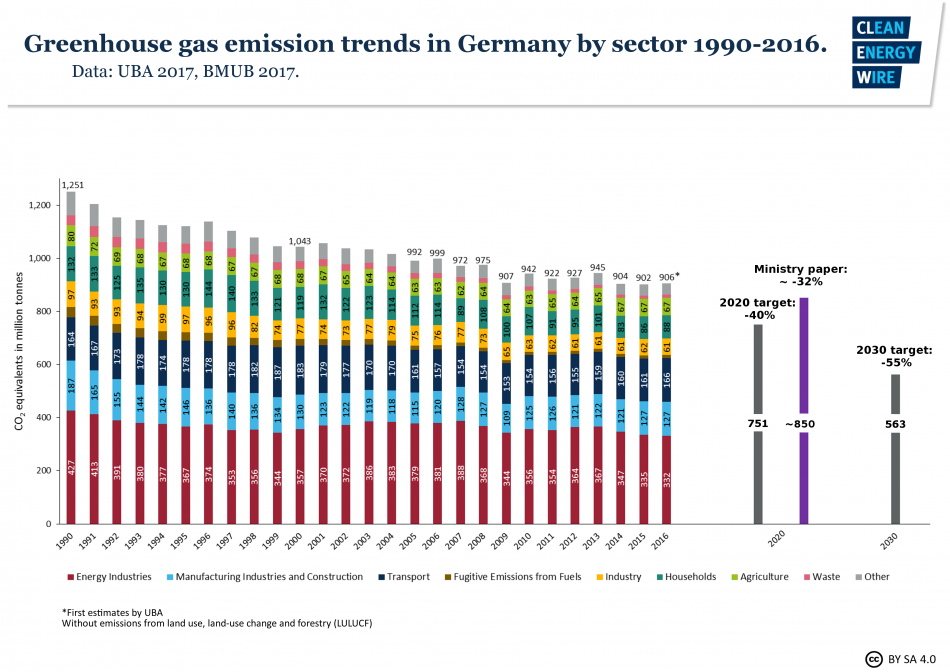Germany set to widely miss climate targets, env ministry warns
Germany is headed for a clear failure to meet its 2020 climate targets, according to calculations by the country's environment ministry. Without further action, Germany's CO2 emissions will only be 31.7 to 32.5 percent below 1990 levels, an internal environment ministry paper seen by the Clean Energy Wire shows. Given the official target of cutting emissions by 40 percent, the ministry warns that a failure of this magnitude would constitute a “significant blow to Germany’s climate policy”, and would amount to “a disaster for Germany’s international reputation as a climate leader.”
Germany has made climate protection one of its priorities in its Energiewende, a dual shift from fossil fuel and nuclear power to a renewables-based energy system. Back in July, Berlin also pushed hard to convince the G20 group of leading industrialised and emerging economies to step up their efforts to comply with the Paris Climate Agreement, by keeping all countries but the United States aboard. The next round of international climate negotiations - the COP23 - will take place in Germany in November.
On the eve of the September general elections, German Chancellor Angela Merkel – whose international engagement has earned her the nickname ‘climate chancellor’ – promised that her government will find ways to meet the country’ ambitious climate targets.
Most experts believe that Germany’s only option to drastically cut its emissions in the short term is to close down its dirtiest lignite-fired power plants. This is a prominent Green Party demand in the upcoming coalition talks with Merkel’s conservatives and the free-market FDP.
"The 40 percent target is only achievable with less coal power generation," environment minister Barbara Hendricks said in a statement. "We have such a large electricity surplus that our power system can absorb a large step towards a coal exit."
Hendricks called on Merkel to show the same commitment for climate protection on a national as on the international level. Hendricks's term as environment minister is set to end once the new government is sworn in, because her Social Democrats (SPD) have said they would join the opposition.
In May this year, the government’s forecast already projected an emissions reduction of just about 35 percent.
The ministry’s paper now cites fresh data to prove that even this figure will not be reached. “In summary, the unexpectedly strong economic growth, low energy prices, the continued rise of power exports, and population growth are the main drivers of this development.”
Economic growth and exports will increase coal-fired power generation, while low oil prices will push up demand in the heating and transport sectors, according to the ministry.
“The expected readjustments regarding the 2020 target at the start of the [new] legislative period become ever more urgent and will have to be much more comprehensive than previously assumed”, concludes the paper.
Greenpeace climate expert Karsten Smid said that “climate protection will become the new government’s first test”, adding that it will have to take “as many dirty coal power plants as possible off the grid very quickly”.
The issue of phasing out coal has already proven to be a moot point among potential coalition partners, the CDU and the Green party.
Think tank Agora Energiewende* had already warned in early September that Germany must step up its CO2 reduction efforts without delay if it wants to prevent a spectacular miss of its 2020 climate targets. According to the think tank’s calculations, the country’s emissions might even fall as little as 30 percent.
At the time, the environment ministry said it did not share Agora's “extremely negative” assessment.
Every German government since 2007 has committed to reducing the country’s annual greenhouse gas emissions by 40 percent by 2020 compared to 1990 levels. In 2016, emissions were 28 percent lower than 1990.
*Like the Clean Energy Wire, Agora Energiewende is a project funded by Stiftung Mercator and the European Climate Foundation.


